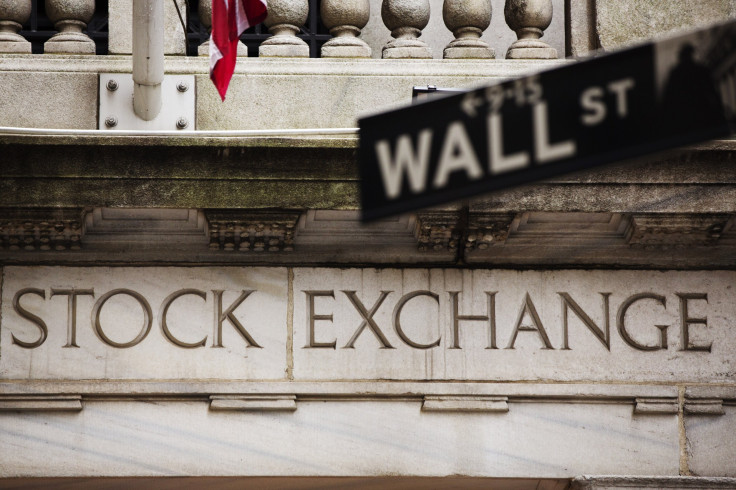Lawmakers Attach Wall Street Deregulation To Omnibus Bill

If you think Congress' last-minute spending bill is just about budgetary matters and avoiding yet another government shutdown, think again. Tucked into the measure is language backed by Republicans and Wall Street-friendly Democrats to roll back landmark bank regulations passed in the wake of the financial crisis of 2008. The key political question now is: Will the cadre of populist Democratic legislators who have made their name being tough on Wall Street use their power to stop the legislation in its tracks?
At least one seems ready to do just that. A source in the office of Sen. Elizabeth Warren of Massachusetts says she will not vote for the omnibus bill if it includes the provisions at issue, which relate to the trading of derivatives. Experts have said these complex financial instruments, such as credit default swaps on mortgage-backed securities, played a key role in creating and exacerbating the financial crisis of 2008.
That led Congress in 2010 to pass the Dodd-Frank Wall Street Reform and Consumer Protection Act, which explicitly says that federal guarantees against losses -- such as from the Federal Deposit Insurance Corporation -- do not apply to banks' most complex derivative transactions. The regulation, which was supposed to take effect next year, was designed to force financial institutions to separate those transactions from more traditional government-guaranteed banking services. It was also supposed to compel banks to separately fund derivative transactions with private money, rather than with government-guaranteed deposits.
Until Dodd-Frank, financial institutions were permitted to use government-guaranteed deposits to finance their derivative transactions. Bank of America, for example, transferred its derivatives business from a Merrill Lynch subsidiary to Bank of America's own government-backed depository institution, meaning losses on those derivatives could be covered by taxpayers.
Under the language attached to this week's omnibus spending bill -- which was negotiated with bipartisan support -- the proposed rules would be eliminated before they were set to take effect, meaning other financial institutions could follow Bank of America's lead. Critics say that could put taxpayers on the hook for future losses that come from derivative trades that they say are too risky to be guaranteed by the public. FDIC Vice Chairman Thomas Hoenig issued a statement slamming the move to repeal so-called "push-out requirements." Derivatives should be traded "in the open market, outside of taxpayer-backed commercial banks," he said.
“The section of Dodd-Frank that Congress is proposing to repeal was put in place to help prevent future bailouts of too-big-to-fail banks," said Lisa Donner, executive director of Americans for Financial Reform, a group that advocates for tougher bank regulations. "It cordons off the kinds of extraordinarily risky transactions that were at the heart of the financial crisis. Including this repeal in the budget is outrageous. It’s a giveaway to a tiny handful of the biggest Wall Street banks that puts the country’s financial and economic stability at risk.”
U.S. Rep. Jeb Hensarling, the Republican chairman of the House Committee on Financial Services, has cast his party's push to eliminate the regulation as a crusade to improve the economy.
“Those who create jobs for America are drowning in a sea of red tape preventing them,” he said in 2013 when the House passed a Citigroup-sculpted bill to weaken financial regulations, including those governing derivatives.
A spokesman for Citigroup has said that the derivatives regulation in question "does absolutely nothing to create a safer financial system" and that it creates "undue costs and burdens on U.S. financial firms."
Democrats were quick to criticize the proposal to include the derivatives legislation in a time-crunched, year-end spending bill.
"This provision, allowing big banks to gamble with money insured by the FDIC, opens the door to another taxpayer-funded bailout of big banks -- forcing middle-class families to bear the burden of Wall Street’s mistakes," said House Minority Leader Nancy Pelosi in a statement. Massachusetts' Warren, who has championed tougher regulation on Wall Street, spoke out against the language on the Senate floor Wednesday morning. And Sen. Sherrod Brown, a senior Democrat on the Senate Banking Committee, said, "This giveaway to Wall Street would open the door to future bailouts funded by American taxpayers. ... This provision, originally written by lobbyists, has no place in a must-pass spending bill.”
In her Senate floor speech, Warren said she is urging her House colleagues "to withhold support from [the omnibus] until this risky giveaway is removed from the legislation." But with the prospect of a government shutdown looming in the event the spending bill does not pass, representatives for Warren and Brown declined to answer International Business Times' questions about whether the senators ultimately will filibuster the omnibus legislation if the provisions are included. Crafting the $1.1 trillion bill in time (barely) to avoid a shutdown was a bipartisan political achievement; scuttling it is likely to bring down heavy criticism, and not just from the Wall Street crowd.
Republicans can still relent and remove the changes to Dodd-Frank. The Rules Committee will meet Wednesday afternoon to set the technical requirements for the passage omnibus bill. During that process, the bill can be quickly amended before it heads to a full vote in the House on Thursday. But doing so will require a signoff from House Speaker John Boehner.
"This is a defining moment," said Jeff Connaughton, a former top Senate aide and the author of the book "The Payoff: Why Wall Street Always Wins." "Senators who say they are serious about reforming Wall Street should use their power to block this bill until these provisions are removed."
Ginger Gibson contributed to this report.
© Copyright IBTimes 2024. All rights reserved.












